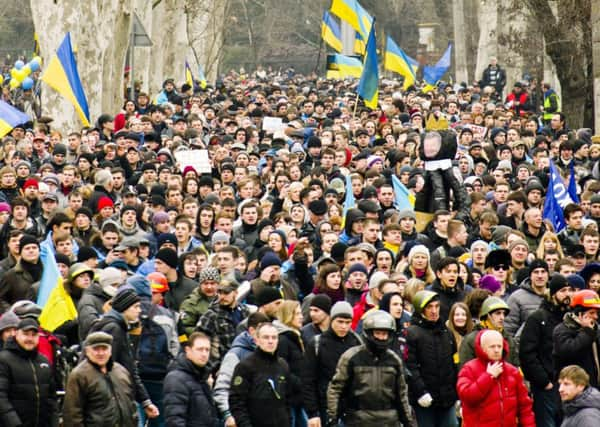Leaders: Ukraine crisis | RBS accounts


The country has ordered a full military mobilisation in response to Russia’s build-up of its forces both in the Crimea and now along the length of the eastern Ukrainian border. The prime minister has warned Ukraine is “on the brink of disaster”. US president Obama has called the Russian troop deployments a “violation of Ukrainian sovereignty” and has warned that Moscow may be ejected from the Group of Eight major industrial nations. The UK has suspended preparation for the G8 summit due in Russia in June.
The military build-up is eerily reminiscent of the Soviet suppression of the Hungarian uprising in 1956. More recently there was Putin’s slap down of Georgia in the 2008 South Ossetia War. It is these disturbing parallels that inform demands on Western leaders for the firmest response to dissuade Russia from a full scale invasion of the Ukraine. Yet its determination to keep the country firmly within the Russian fold is rooted in the huge losses suffered in the Second World War.
Advertisement
Hide AdAdvertisement
Hide AdUkraine has deep historical, political, economic and above all geo-political resonance for Russia. Yet the world cannot stand back and let Russian military action unfold without the firmest response. Intervention of any kind is always a last resort, but fast-unfolding events may compel the west to the brink. Such a posture can be justified on the grounds that Ukraine’s western neighbours dare not risk waiting until the Russian army starts a bloodbath or has so humiliated the interim Ukrainian government that it succeeds in securing major concessions under severe duress.
However, military intervention of any kind really is a last resort. This is a central European matter where we have little competence – but plenty of competence to make things worse. There are still tough steps to be taken through the United Nations while the US and the European Union apply the strongest diplomatic pressure.
One avenue that Western countries could urgently explore is putting together a package via the International Monetary Fund to help stricken Ukraine meet some of its huge debts. Much of these have been incurred over vital gas deliveries from Russia. It is hard to recall that it was only shortly before Christmas that Russia agreed a $15 billion aid package to Ukraine, including a deal offering lower gas prices in return for progress in tackling the substantial debts of circa $2bn a year incurred by the Ukraine reaching back to the 1990s.
The crisis now demands a UN or US top level diplomatic intervention before we draw up the guns. But our commitment behind any such diplomatic intervention must be real and credible. And for that, the West needs to be clear what it is exactly that it is seeking to achieve – a consideration not always evident in recent previous interventions in troubled theatres.
‘Free’ banking illusion fade out by RBS
HOW richly ironic that Ross McEwan, the head of RBS, should pronounce that the end of free banking is nigh. In truth, “free” banking has always been a misnomer, not least at RBS, which has enjoyed a £45 billion lifeline from the taxpayer. There is nothing “free” from a bank that has just posted £8.2 billion of losses with little sign of an end to its fines, its bad debt provisioning – and continuing taxpayer support.
Of course, Mr McEwan was referring to “free” current account banking at the point of use. But even here the idea that such a service should be costless to customers is a myth. RBS has maintained considerable loyalty among its personal account customers for the strides it has made in internet and mobile banking (not without its glitches) which enable them to enjoy streamlined 24-hour banking services. The IT investment has been considerable. Mr
McEwan has moved in the interests of transparency to show that the constant development of this service inevitably incurs costs.
At the same time he has pledged to do away with short-term “teaser” rates and come-ons which can confuse customers while effectively penalising existing ones. Better, surely, that we have a “square deal” offering that customers can clearly understand.
Advertisement
Hide AdAdvertisement
Hide AdThe concern of Labour is that this could lead to people being forced out of the banking system. This is possibly true. But the solution does not lie in perpetuating a mythology sustained by shielding customers from the truth.
Hidden subsidies may give the illusion that a “free” service can be sustained forever. But it is this sort of behind-the-screens accounting that causes customers to distrust banks. And, in the case of RBS, the rebuilding of trust is paramount.